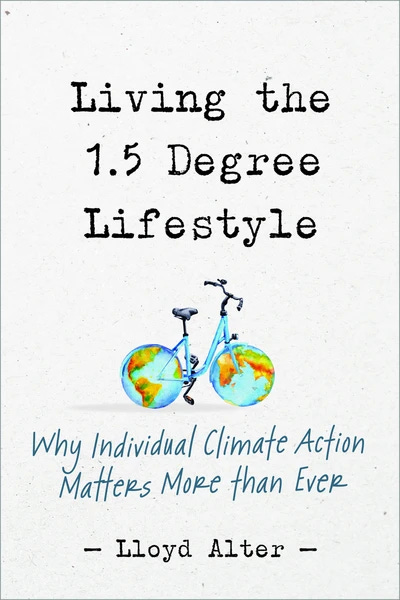Now available for pre-order!
Living the 1.5 Degree Lifestyle is at the printer.
Stop thinking about efficiency and start thinking about sufficiency
Living the 1.5 Degree Lifestyle reveals the carbon cost of everything we do, identifying where we can make big reductions, while not sweating the small stuff.
The international scientific consensus is that we have less than a decade to drastically slash our collective carbon emissions to keep global heating to 1.5 degrees and avert catastrophe. This means that many of us have to cut our individual carbon footprints by over 80% to 2.5 tonnes per person per year by 2030. But where to start?
Drawing on Lloyd Alter's journey to track his daily carbon emissions and live the 1.5 degree lifestyle, coverage includes:
What it looks like to live a rich and truly green life
From take-out food, to bikes and cars, to your internet usage – finding the big wins, ignoring the trivial, and spotting marketing ploys
The invisible embodied carbon baked into everything we own and why electric cars aren't the answer
How to start thinking about sufficiency rather than efficiency
The roles of individuals versus governments and corporations.
Grounded in meticulous research and yet accessible to all, Living the 1.5 Degree Lifestyle is a journey toward a life of quality over quantity, and sufficiency over efficiency, as we race to save our only home from catastrophic heating.
About the Author
Lloyd Alter is a writer, public speaker, sustainable design instructor, and former architect, builder, and developer. He has written over 14,000 articles published on Treehugger.com and the Mother Nature Network, and he has contributed to The Guardian, Corporate Knights, and Azure magazines. He lives in Toronto, Ontario.


I found (and replied to) the following on Twitter. I’m posting a more complete reply here.
Lloyd Alter
@lloydalter
I don’t know why I spent a year writing a book only to have @MontePaulsen summarize the whole damn thing in a tweet.
Quote Tweet
Monte Paulsen
@MontePaulsen
· Oct 22
Replying to @RachaelOwensArc
Bicycles, Passivhaus, and locally grown food get is most of the way there, while making our lives more enjoyable and less expensive. Electric SUVs, smart homes, and fake meat are but short-term distractions. @lloydalter
5:50 AM · Oct 22, 2021·TweetDeck
My "more complete" reply:
Bicycles, Passivhaus, and locally grown food are certainly a good chunk of the solution. A more complete call-to-action is “Less Now, More Later” – less heating, less cooling, less driving, less flying, less meat-eating, and less procreation (2 children max). The following is my short version of the call-to-action.
Sea levels were 78 feet higher and temperatures were 5°F warmer, when, 3.6 million years ago, CO2 concentration last reached our current level of 420 ppm. We need to promptly reduce our CO2 emissions to the sustainable level of 3 tons/person/year (current emissions: global 4.5, USA 17.5). Tenaciously spread the “Less Now, More Later message”. Now, embrace a “Less” lifestyle – less heating and cooling (“GreenBetween 55°F to 85°F”, https://greenbetween.home.blog/), less driving, less flying, less meat-eating, less procreation (2 children max). Later, we can embrace a “More” lifestyle made carbon-free by implementation of green technology and infrastructure. In addition to your share of the common footprint, what’s in your carbon footprint? 7 tons for heating your home above 55°F? 4 tons for driving 12,000 miles at 29 miles per gallon? 2 tons for flying 10,000 miles? 1 ton for eating one serving of beef each day?…
For the vast majority of the world it is “GreenBetween 13°C to 30°C”, every bit as memorable as 55°F to 85°F. Yes, no coincidence, it was planned that way after starting to think internationally and realizing the original 60°F to 80°F is not memorable in Centigrade.
The focus here is prompt, significant, and widely applicable. For example, in the near term, most existing buildings are not going to be replaced by Passivhaus, most fuels are going to remain non-green, most existing vehicles are not going to be replaced by electric/hydrogen vehicles, most existing airplanes are not going to be replaced by electric/hydrogen airplanes, non-green cattle-raising is not going to be replaced by green cattle-raising...
Congratulations!